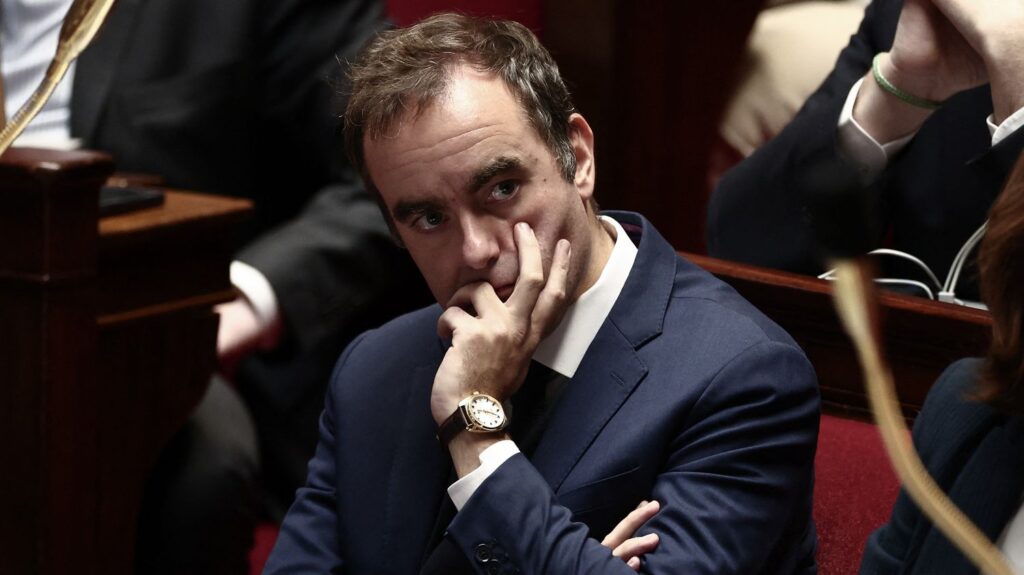/2023/07/06/64a68815cd1a7_placeholder-36b69ec8.png)
Published
Reading time: 7min
/2025/11/02/000-82lt4jt-69077aa36e356156419912.jpg)
While the deadline set by the Constitution for adopting the budget at first reading is fast approaching, some elected officials are talking about the possibility of passing through ordinances, a special law… or even article 49.3.
Will Parliament succeed in adopting a budget on time? After more than a week of tense debates in the National Assembly, the question is on everyone’s lips Monday, November 3. Especially since the debates are getting bogged down and compromises seem difficult to reach in the hemicycle. So, certain political leaders no longer hide their desire to consider alternatives, such as a special law for the budget, recourse to ordinances or even the return of article 49.3 of the Constitution. We explain to you why these scenarios are more and more likely.
Because the debates are endless
Time is running out in the National Assembly. While the vote on first reading of the revenue part of the finance bill (PLF) was to take place on Tuesday, November 4, several hundred amendments must still be studied. The deputies will even have to pause the debates to devote themselves, from Tuesday, to examining the Social Security financing bill (PLFSS). The first part of this text must in theory be voted on on November 12… unless the deadlines are missed again. The deputies will then resume the examination and vote on the finance bill before transmitting it to the Senate.
These repeated delays could well derail the entire budget. And for good reason, the Constitution sets November 23 at midnight as the deadline for adopting the budget at first reading and December 23 for the entire debate on the state budget. A very tight schedule given the slow pace of debates in Parliament since the start of the debates. Under these conditions, it seems “highly likely” that the National Assembly cannot complete the examination of the budget, estimated the Republican deputy and general budget rapporteur Philippe Juvin, Sunday November 2, on LCI.
Because the differences seem insurmountable
Behind these difficulties in keeping the budget debate timetable lies a fundamental problem: differences which seem increasingly insurmountable between the different blocs which make up the National Assembly since the dissolution in the summer of 2024. “Cultural change is not happening as quickly in our minds as I had imagined”had to recognize the Prime Minister in front of the deputies. THE “bet” of the renunciation of 49.3 “works a little, but not completely”he conceded. And as proof: no group seems certain to approve this budget with provisions tinged with very diverse political colors.
The Republicans thus consider that the text is not “not voteable as it stands”. Same story with the National Rally, which still wants a dissolution and denounces, through its vice-president Sébastien Chenu, “a budget made up of bits and pieces, without any coherence, which does not tackle the toxic spending of the State”. La France insoumise also maintains its fierce opposition to the project and attacks the socialists, more favorable to a compromise and accused of having “changed alliance” by Jean-Luc Mélenchon. The first secretary of the Socialist Party, Olivier Faure, continues to threaten the government with censorship if new concessions are not made for greater tax justice. Even within the presidential Renaissance party, some no longer hide their annoyance at certain measures voted by the left or the RN.
In this context, in an interview with ParisianSébastien Lecornu has once again advocated a “change of method” and one “small steps strategy”. Its ministers will soon bring together all the budgetary officials designated by the parliamentary groups, far from the cameras, to try to move forward on “the main principles of landing”. The head of government therefore makes an appointment in “second reading” in the Assembly, after the passage of the bill by the Senate. Which, according to him, will constitute “the moment of truth”.
Because other scenarios are on the table
Faced with the risk of not adopting a budget by the end of the year, some elected officials are starting to consider – or even prefer – other solutions. “We know very well that we are going to be hit with prescriptions”launched the leader of the centrist senators Hervé Marseille on Public Senate. “We’re heading straight for the prescriptions”also estimated Marine Le Pen. Because if Parliament has not decided within 70 days, the government can implement its initial project by ordinance, a procedure unprecedented under the Fifth Republic. “The stagnation of budgetary debates risks leading us straight towards the use of ordinances”analyzes the constitutionalist Benjamin Morel on.
Another option considered in the event of rejection of the budget: the tabling of a special law before December 19, to authorize the State to collect existing taxes. Expenditures would be frozen by decree, pending the vote on a budget in early 2026. This is what was done at the end of 2024 after the failure of the budget vote. But this option would cost the economy 11 billion euros, according to Bercy. However, these scenarios appeal to some of the parliamentarians of the central bloc, because they would allow them to avoid voting for measures contrary to their convictions, such as tax or spending increases.
There remains another option: the return of article 49.3, which the Prime Minister promised not to use. The president of the MoDem group, Marc Fesneau, would prefer this option at the end of the budget discussion, which would avoid the Socialists having to vote on the budget, an incongruity for an opposition group. “It would be a compromise 49.3, not to force Parliament, but to act on what there is agreement on”believes the MP in Release.
So, special law? Prescriptions? Return of 49.3? “It’s far too early to discuss these hypotheses. Starting to talk about the future implies that we already have a strategy to avoid Parliament. This is not the case”swept away Laurent Panifous, Minister of Relations with Parliament, on Public Senate. Until when?


